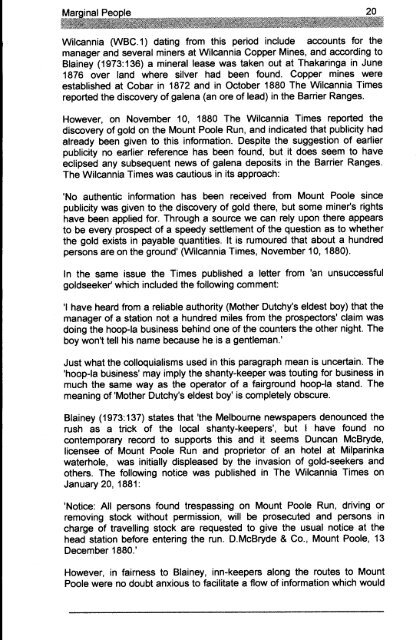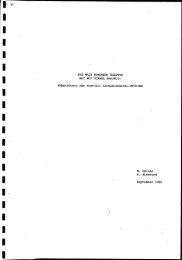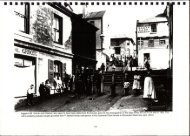Adec Preview Generated PDF File - The Sydney eScholarship ...
Adec Preview Generated PDF File - The Sydney eScholarship ...
Adec Preview Generated PDF File - The Sydney eScholarship ...
You also want an ePaper? Increase the reach of your titles
YUMPU automatically turns print PDFs into web optimized ePapers that Google loves.
Wilcannia (WBC.1) dating from this period include accounts for the<br />
manager and several miners at Wilcannia Copper Mines, and according to<br />
Blainey (1973:136) a mineral lease was taken out at Thakaringa in June<br />
1876 over land where silver had been found. Copper mines were<br />
established at Cobar in 1872 and in October 1880 <strong>The</strong> Wilcannia Times<br />
reported the discovery of galena (an ore of lead) in the Barrier Ranges.<br />
However, on November 10, 1880 <strong>The</strong> Wilcannia Times reported the<br />
discovery of gold on the Mount Poole Run, and indicated that publicity had<br />
already been given to this information. Despite the suggestion of earlier<br />
publicity no earlier reference has been found, but it does seem to have<br />
eclipsed any subsequent news of galena deposits in the Barrier Ranges.<br />
<strong>The</strong> Wilcannia Times was cautious in its approach:<br />
'No authentic information has been received from Mount Poole since<br />
publicity was given to the discovery of gold there, but some miner's rights<br />
have been applied for. Through a source we can rely upon there appears<br />
to be every prospect of a speedy settlement of the question as to whether<br />
the gold exists in payable quantities. It is rumoured that about a hundred<br />
persons are on the ground' (Wilcannia Times, November 10, 1880).<br />
In the same issue the Times published a letter from 'an unsuccessful<br />
goldseeker' which included the following comment<br />
'I have heard from a reliable authority (Mother Dutchy's eldest boy) that the<br />
manager of a station not a hundred miles from the prospectors' claim was<br />
doing the hoop-la business behind one of the counters the other night. <strong>The</strong><br />
boy won't tell his name because he is a gentleman.'<br />
Just what the colloquialisms used in this paragraph mean is uncertain. <strong>The</strong><br />
'hoop-la business' may imply the shanty-keeper was touting for business in<br />
much the same way as the operator of a fairground hoop-la stand. <strong>The</strong><br />
meaning of 'Mother Dutchy's eldest boy' is completely obscure.<br />
Bfainey (1973: 137) states that 'the Melbourne newspapers denounced the<br />
rush as a trick of the local shanty-keepers', but I have found no<br />
contemporary record to supports this and it seems Duncan McBryde,<br />
licensee of Mount Poole Run and proprietor of an hotel at Milparinka<br />
waterhole, was initially displeased by the invasion of gold-seekers and<br />
others. <strong>The</strong> following notice was published in <strong>The</strong> Wilcannia Times on<br />
January 20, 1881:<br />
'Notice: All persons found trespassing on Mount Poole Run, driving or<br />
removing stock without permission, will be prosecuted and persons in<br />
charge of travelling stock are requested to give the usual notice at the<br />
head station before entering the run. D.McBryde & Co., Mount Poole, 13<br />
December 1880.'<br />
However, in fairness to Blainey, inn-keepers along the routes to Mount<br />
Poole were no doubt anxious to facilitate a flow of information which would




